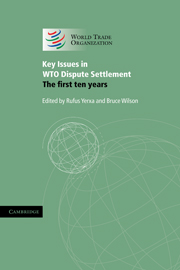Book contents
- Frontmatter
- Contents
- Notes on contributors
- Preface
- Table of cases
- Abbreviations
- PART I Introduction and General Considerations
- PART II The WTO Dispute Settlement System: Its Processes and Its Institutions
- PART III The WTO Dispute Settlement System: Systemic and Other Issues
- 12 The role of lawyers in the WTO dispute settlement system
- 13 Jurisdiction in WTO dispute settlement
- 14 Due process in WTO disputes
- 15 Standards of review in WTO panel proceedings
- 16 Administration of evidence in WTO dispute settlement proceedings
- 17 Confidentiality issues under the DSU: fact-finding process versus confidentiality
- 18 Panels' consultations with scientific experts
- 19 Amicus curiae participation in WTO dispute settlement: reflections on the past decade
- 20 Suspension of concessions and retaliation under the Agreement on Safeguards: the recent US – Steel Safeguards case
- 21 Compliance with WTO dispute settlement decisions: is there a crisis?
- 22 DSU review: a view from the inside
- PART IV Annexes
20 - Suspension of concessions and retaliation under the Agreement on Safeguards: the recent US – Steel Safeguards case
from PART III - The WTO Dispute Settlement System: Systemic and Other Issues
Published online by Cambridge University Press: 04 August 2010
- Frontmatter
- Contents
- Notes on contributors
- Preface
- Table of cases
- Abbreviations
- PART I Introduction and General Considerations
- PART II The WTO Dispute Settlement System: Its Processes and Its Institutions
- PART III The WTO Dispute Settlement System: Systemic and Other Issues
- 12 The role of lawyers in the WTO dispute settlement system
- 13 Jurisdiction in WTO dispute settlement
- 14 Due process in WTO disputes
- 15 Standards of review in WTO panel proceedings
- 16 Administration of evidence in WTO dispute settlement proceedings
- 17 Confidentiality issues under the DSU: fact-finding process versus confidentiality
- 18 Panels' consultations with scientific experts
- 19 Amicus curiae participation in WTO dispute settlement: reflections on the past decade
- 20 Suspension of concessions and retaliation under the Agreement on Safeguards: the recent US – Steel Safeguards case
- 21 Compliance with WTO dispute settlement decisions: is there a crisis?
- 22 DSU review: a view from the inside
- PART IV Annexes
Summary
Procedural background of the US – Steel Safeguards case
The United States, by Presidential Proclamation of 5 March 2002, adopted far-reaching safeguard measures on ten steel product groupings in the form of additional tariffs of up to 30 per cent for a duration of three years, becoming effective 20 March 2002.
From the outset a great number of WTO Members voiced their concerns on the compatibility of these measures with US obligations under the WTO agreements and in particular the Agreement on Safeguards and GATT 1994.
The European Communities requested formal consultations with the United States under Article 4.1 of the DSU shortly after the issuance of the proclamation. A significant number of other WTO Members (Norway, Switzerland, China, Korea, Brazil, Japan and New Zealand) did likewise.
Joint consultations were held in mid-April 2002, but did not yield any solution of the dispute.
The eight Members referred to above subsequently sought the establishment of a panel under Article 6 of the DSU. The panels were eventually established and composed and the panel issued its reports in July 2003.
The panel reports found largely in favour of the complainants. This result, which was appealed by the United States, was essentially confirmed by the Appellate Body in its report of 10 November 2003.
- Type
- Chapter
- Information
- Key Issues in WTO Dispute SettlementThe First Ten Years, pp. 232 - 241Publisher: Cambridge University PressPrint publication year: 2005



